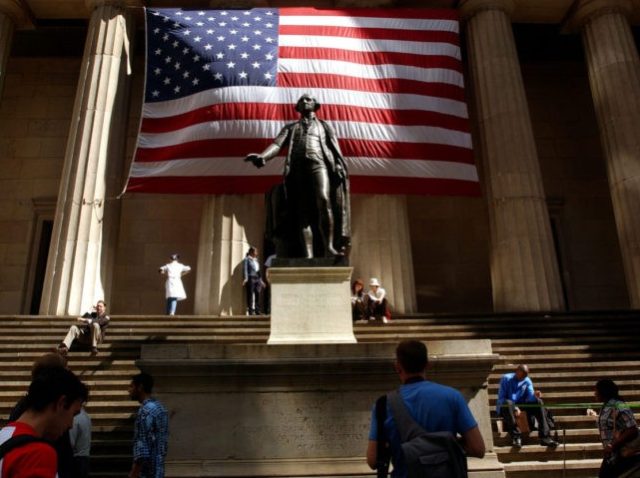President Donald Trump declared Wednesday that the United States “was built on Tariffs.”
The president’s claim, issued via Twitter, prompted a number of challenges from critics. But Trump has history on his side.
Our Country was built on Tariffs, and Tariffs are now leading us to great new Trade Deals – as opposed to the horrible and unfair Trade Deals that I inherited as your President. Other Countries should not be allowed to come in and steal the wealth of our great U.S.A. No longer!
— Donald J. Trump (@realDonaldTrump) August 15, 2018
One of the very first acts of Congress was the passage of the Tariff Act of 1789. President George Washington signed it into law on July 4, 1789, commemortating the young nation’s Declaration of Independence.
“A free people ought not only to be armed, but disciplined; to which end a uniform and well-digested plan is requisite; and their safety and interest require that they should promote such manufactories as tend to render them independent of others for essential, particularly military, supplies,” Washington said in his first address to Congress six months later.
The United States could not depend on merely importing inventions from other nations, Washington said, but must take measures to produce goods at home.
“But I cannot forbear intimating to you the expediency of giving effectual encouragement, as well to the introduction of new and useful inventions from abroad, as to the exertion of skill and genius in producing them at home,” he told Congress.
Washington’s Treasury Secretary Alexander Hamilton a year later wrote in his Report on Manufactures: “The wealth … independence, and security of a Country, appear to be materially connected with the prosperity of manufactures. Every nation … ought to endeavor to possess within itself all the essentials of national supply. These compromise the means of subsistence, habitation, clothing, and defence.”
“The great expansion of commerce from 1793 to I807, brought much wealth to this country which enabled the industrial development to be more rapid when it did come than it could have been in 1790,” University of Chicago professor William Hill observed in 1893.
Seventeen years later, as tensions with Great Britain mounted, Congress passed and Thomas Jefferson signed the Embargo of 1807, imposing extremely high tariffs on all manufactured goods.
“It was really good for the textile industry,” according to Smithsonian curator Peter Liebhold, “really the beginning of the manufacturing system in the United States.”
Just as today, there were objections to the tariffs by those who thought they weighed too heavily on their economic interests. Importers of cheap copper, for example, complained that the tariff was raising its cost too much. But America’s early leaders chose to put national interest first.
As Pat Buchanan demonstrated in his 1998 book The Great Betrayal, the tradition of tariffs did not die with the founders but went on to inspire generation after generation of American leaders, including Andrew Jackson, Abraham Lincon, William McKinley, Teddy Roosevelt, Warren Harding and Calvin Coolidge.
“Economic patriotism put America first, and made America first,” Buchanan wrote in a recent column.
Those Boston Tea Party folks are gonna be stunned to learn our country was built on tariffs. https://t.co/N5wCq0SFLt
— Dan Primack (@danprimack) August 15, 2018
One of the main objections to Trump’s view of history seems to be rooted in a misunderstanding of the famous Boston Tea Party. But the Boston Tea Party was not a rebellion against a tariff aimed at fostering or protecting domestic industry. It was, instead, a reaction against the Stamp and Townsend Acts, which were imposed taxes intended to extract revenue from the American colonists. They bore no resemblance to the tariffs of George Washington, Thomas Jefferson, or Donald Trump.
If anything, the example of the Boston Tea Party supports Trump’s view of history. The colonists believed they were being treated unfairly when it came to the terms of trade imposed by the British and chose to reject the imports by dumping them into the Boston harbor. That act itself was a kind of tariff, albeit one of a populist mob rather than imposed by an elected government.

COMMENTS
Please let us know if you're having issues with commenting.